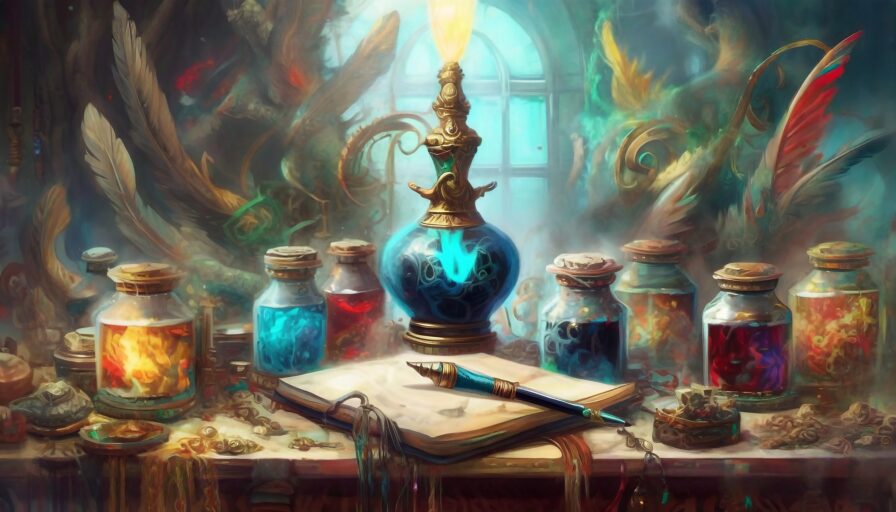
Dear Father,
For many years I have wanted to write to you, but I did not have the courage before now. The reason is this: your daughter became a sorcerer.
I know you warned me. You told me of their devious words, the incantations slipped under doors and through windowpanes and beneath the pillows of unsuspecting sleepers. But sorcery is not as you think, Father. Incantations are useful at times, but in truth there is little power in the forms of letters or their order. No, a sorcerer’s magic lies not in our words but in our inks.
I can picture you already, Father, frowning in disbelief. But let me show you.
The first ink I learned looks innocuous enough: a simple brown-black that dries slow and smudges readily. Of all the sorcerer’s inks, it is the most easily made. The binder is tree-gum, the same as that used by merchants and bureaucrats for the inks on their ledgers and account rolls. The carrier, too, is simply water, as from any stream or village well. It is the pigment that gives the ink its potency. Lampblack, it is—only it must be taken from a candle burned by the bedside of one dying. You once told me that sorcerers steal into houses and murder those within. You were wrong—but it is true that death often follows us. And yet from it we make hope: for this ink is for comfort, for lighting a way, for guiding a person through their darkest days.
Still I sense your incredulity. Well, then: another. This ink is more difficult—its ingredients take more searching out, its manufacture more skill. The pigment is crushed whorlshells, found only on the beaches of the western peninsula. The carrier comprises the exhausted tears of a scholar who has just solved a fiendish equation. For the binder, the sweat of a master craftsman is best—though a talented journeyman will do in a pinch. This ink is the rich purple of a midnight sky. It penetrates deep into paper, impossible to remove.
Do you remember, Father, that time when a sorcerer came to the village and in your fear you seized me and Toby and shut us in the cowshed? I remember. You left us there two days. Toby got hungry, and he cried, and I could do nothing but rock him to and fro like Mother used to do when he was small. But on the second day, a slip of paper slithered between the planks of the wall. I took it up, and the curling purple shapes upon it were like nothing I’d ever seen. It was then I vowed that I would learn my letters, no matter that you forbade it. For, you see, this second ink is for curiosity, for questing, for answers, for waking a sleeping mind.
Are you angry, Father, that a sorcerer got to your daughter after all? Well, I am angry too. For do you recall that other scrap of paper, the one that slid beneath our door as Mother lay, feverish, upon the bed? I caught a glimpse of the shimmering silver ink and knew it was meant for her. But you got there first. Remember how you snatched it up, threw it in the fire, and struck me for daring even to look at it?
I know now that ink is the hardest to make. The crushed beak of a phoenix is its pigment, its binder the sap of a yew tree grown around the bones of a stillborn babe, its carrier water dripped from the beard of a thirsty pilgrim. That ink is for healing, Father. It is for tranquility and freedom from pain. It would have cured her, if you had but let it. Instead, I watched through tear-blurred eyes as it curled and blackened in the grate.
So, you see, you were wrong about sorcerers. They do not bring pain and sorrow; they take them instead and make them something new. That is why I wrote to them, in my halting, self-taught hand, after Mother died. That is why I took Toby and ran.
I suppose you are wondering why I write after all these years, why I reveal our secrets to you like this. After all, this knowledge is strictly guarded, known only to initiates who have taken the sorcerer’s oath. Well, Father, let me tell you about one last ink.
This ink is of my own concoction. You will see that it is a rusty brown, that it bleeds easily into the fibers of the paper. That color comes from my own blood, shed in anguish on the day I ran. The carrier is Toby’s tears, which fell for many months after. The binder is boiled from Mother’s fingernails—I trimmed them myself before her burial. This ink fades quickly to invisibility; even now you will see the first words of this letter vanishing, even as your heart clenches in your chest and glittering motes hover before your eyes.
But do not fear, Father. This ink is not a poison but a gift.
I gift you understanding. I gift you clarity of heart and mind, the ability to look at others and see not threats but possibilities. I gift you kindness for the rest of your days.
My words will be disappearing swiftly now and, along with them, your memories of us. I am sorry for that; the sorcery of inks can be tricksome and I could not find a way to avoid it. So before these letters fade I will simply say: goodbye, Father. Live well. Live kindly.
Your daughter,
Ephrina
Sorcerer
Edited by a Fallon Clark and Sophie Gorjance.
Jess Hyslop is a British writer of fantasy, fabulism, and science fiction. Her short stories have appeared in venues such as Cossmass Infinities, Interzone,andBlack Static. Jess can be found online at www.jesshyslop.com. Offline, she resides in Oxford with a number of slowly decaying houseplants.

